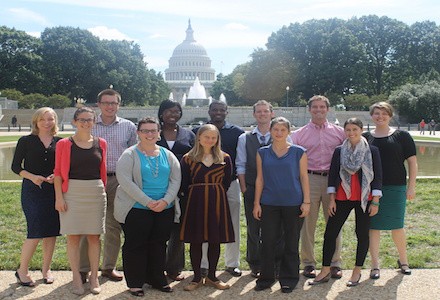Deadline: January 25, 2015
Applications are now open for Leland International Hunger Fellows Program. This program trains emerging leaders in the fight to end hunger worldwide. It is a unique two-year program that combines field and policy work. During the first year, fellows work directly to build food security in the field. In the second year, fellows apply their field experience to the design of sound development policy at the organizational, national, and international level.
The Leland International Hunger Fellows Program emphasizes service and is designed to build a network of anti-hunger leaders who share a common identity as Leland Fellows. Fellows are encouraged to think of each other, as well as Leland alumni and CHC (Congressional Hunger Center) staff, as long-term personal and professional resources in the fight against hunger and poverty.
Leland Fellows work on a variety of issues related to food security, including: Agricultural development, Maternal and child nutrition, Climate change adaptation,Agribusiness development, Women’s empowerment.
Within these fields, fellows engage in a range of activities during their field and policy placements. Examples include:
- Monitoring and evaluating programs/projects
- Conducting qualitative and quantitative research
- Assisting or leading in the development and implementation of new programs/projects
- Developing technical training resources
- Conducting trainings
- Transforming research into policy documents,briefings and white papers
- Participating in food security advocacy coalitions
Awards/Benefits
- Monthly stipend
- Comprehensive medical, dental and emergency insurance
- Housing and relocation allowances
- Professional development funds
- Training and advising
- Access to a dynamic fellowship community and alumni network
Requirements/Selection Criteria
- Strong commitment to fighting hunger
- Graduate degree or equivalent experience in a relevant discipline
- One year of combined work or volunteer experience in a developing country
- Demonstrated leadership qualities and abilities
- Ability to communicate and work across cultural contexts
- Critical thinking skills and a high degree of self-motivation
- Ability to work independently as well as on a team
- Flexibility
Note: Leland Fellows must be authorized to work in the United States for the full duration of the program. The procurement or extension of this authorization is the responsibility of the applicant.
Application Process
Applicants to the Leland Program apply to a specific placement (see placement samples) rather than to the fellowship itself. These placements are selected through a competitive application process in which prospective host organizations submit a detailed scope of work to CHC for consideration. In addition to CHC’s general requirements, applicants must possess the skills specified by the host organization for each specific placement. These can include foreign language fluency, a particular graduate degree or expertise, and specific technical skills and/or experience.
The application has three parts:
- an on-line information form
- an uploaded application document consisting of a cover letter, resume and two short essays;
- and two letters of recommendation. (Also, Current students will also need to upload a transcript of their coursework; the transcript can be either official or unofficial)
Your cover letter, resume and short essays should be combined into ONE .pdf or MS Word (.doc or .docx) document, no more than 4 pages in length: a one-page cover letter, 1-2 page resume and one-page short essay sheet. Please give your document the filename: Fellowship Number_LastName_FirstName.doc (ex. 6-01_Smith_Jane.doc).
- Resume: Two pages maximum. Please be certain to include your email address and phone number.
- Cover letter: Please write a standard cover letter addressed to the host organization (not to the Leland Program). It should convey those skills, experiences and qualities that make you a good match for the specific fellowship placement to which you are applying. If applying to two placements, we recommend that you tailor your cover letter to each. Please be sure to also reference the fellowship number in the letter.
- Short essay questions: Using this form please answer the following questions, staying within the given word limits. Note that your answers will also serve as a writing sample. (1)What is your primary motivation for applying to be a Leland Fellow? (150-200 words) (2) What valuable lesson have you learned from previous overseas experience and how does it affect your approach to working in international development? (150-200 words)
- Transcript (students): If currently a student, please upload a transcript of your coursework, either official or unofficial, in PDF format.
- Two letters of Recommendation: Using the reference form linked below, please ask your references to evaluate your qualifications to be a Leland Hunger Fellow, with emphasis on demonstrated leadership qualities and experience as well as professional skills. At least one letter should be from a supervisor (as opposed to a professor or advisor). Candidates applying to more than one placement should use the same two recommendation letters for both placements (i.e. please only submit two recommendation letters, not four). Letters must be sent by the reference by email to [email protected]; by fax to 202.547.7575 (attention of the Leland Program Selection Committee); or by post to:
Selection Committee
The Mickey Leland International Hunger Fellows Program
Congressional Hunger Center
400 North Capitol St. NW
Suite G-100
Washington, DC 20001
Selection Timeline
Mid/late February: Telephone interviews
Late February/early March: Semi-finalists notified
Mid-March – Mid-April: Semifinalists interviewed by Leland Program staff in Washington, DC
Mid/late April: Finalists interviewed by host organizations
Early May: Fellowship offers made
For more information, visit Leland International Hunger Fellows Programs or e-mail [email protected]

